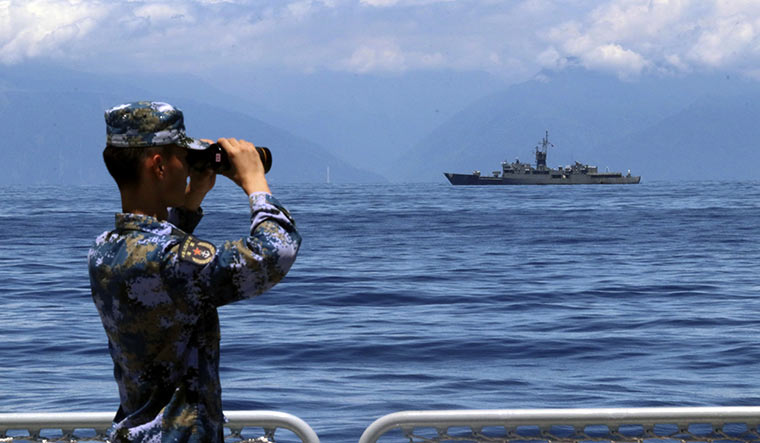Mumin Chen, the deputy representative of the Taipei Economic and Cultural Center in Delhi and professor of international politics at National Chung Hsing University in Taiwan, was the first Taiwanese national to visit Tawang, when he travelled to the border district in Arunachal Pradesh in 2012. It took him three years to get the clearance and the visit was for academic purposes. But it was of great importance for Chen as Tawang is a symbol of the victory of democracy over Chinese aggression. At the moment, his countrymen are experiencing the wrath of the dragon, after the Speaker of the US House of Representatives Nancy Pelosi’s visit to the island nation. He is worried that it would get worse, citing how Russia attacked Ukraine when everyone thought it would not.
Chen feels that the time is ripe for India to strengthen its ties with Taiwan and isolate China militarily and economically. “Many Taiwanese companies are pulling out of China. These companies need an alternative market and manufacturing base, and India can be the ideal destination,”he said in an exclusive interview. Excerpts:
Q. How are people in Taiwan viewing Nancy Pelosi’s visit to the country?
A. The majority in Taiwan welcome her visit. The visit shows America’s support to Taiwan. It is hugely symbolic of the courage and strength shown by two women world leaders, Pelosi and Taiwanese president Tsai Ing-wen (the first female president of Taiwan), who are not talking of war games, but about upholding democratic rights and working together for the prosperity of people. Pelosi’s visit to the National Human Rights Museum in Taipei, which is a symbol of Taiwan’s democratic transition, followed by her meetings with prominent human rights advocates, who were once imprisoned in China, displayed her country’s commitment to upholding human rights and democratic values. I have seen mixed reactions in the Indian media and abroad; some welcomed her visit while others said it was not appropriate. But it is the most important message not just to China but to the world that human values and democracy can never be crushed.
Q. With China flexing its military muscle around Taiwan, is the country in imminent danger?
A. Before Russia attacked Ukraine, did anyone predict it? Everyone said Russia won’t do it. But Russian President Vladimir Putin did it. So whether China will attack our island is something we cannot say because we don’t know what is on Xi Jinping’s mind. No one could guess what was on Putin’s mind, either. He must have his own reasons though some may want to look at it from a geopolitical perspective. The reasons are best known to the leaders who take that decision. I think the same logic applies to the current situation in Taiwan. Xi could be a rational person or not. Who knows! But one thing is clear that if there is escalation of tension or launching an invasion of another country, it will make him a criminal of history. If the Chinese government really cares for the people of Taiwan, then Xi should act more rationally.
Q. There are reports that China wants to complete “re-unification”with Taiwan by 2040.
A. Firstly, the truth is the People’s Republic of China (PRC) never ruled Taiwan. In fact, it did not even exist in 1945 when the World War II ended and Taiwan was placed under governance of the Republic of China. The PRC was established four years later on October 1, 1949. So there is no reason for them to say that Taiwan is part of China. It is a joke.
Even common people in Taiwan, who do not have interest in politics, are feeling disgusted at what China is doing today. They have no connection with the PRC and are proud Taiwanese citizens. If the Chinese care about the people of Taiwan, then they should do good towards them. Any so-called unification, even between two individuals can happen through friendship, mutual respect and appeasement, and never through violence and threat. Here are two separate nations. But eventually we will have to wait and watch what Xi is thinking.
Q. Taiwan has a huge business presence in China.
A. Over the past few decades, Taiwanese companies have invested more than $200 billion in China, which is understandable due to geographic proximity and use of the same language. We all had the perception that China will change one day and with time the society will become more plural, liberal and democratic. When I was a scholar in China in 2001, everyone felt that way. But after 2012, since Xi assumed office, China has not only become powerful but also very aggressive. Now many Taiwanese companies are pulling out of China. The business environment is getting worse, the labour cost is high and the Chinese government is forcing Taiwanese companies to show their loyalty to China by respecting the One China policy and so on. Therefore, more and more companies want to pull out. They not only need an alternative market but a manufacturing base as well.
Q. Do you think India can capitalise on this opportunity to provide a base to Taiwanese companies?
A. Even though India is an ideal destination, many Taiwanese companies go to Vietnam, Thailand, Indonesia and even Bangladesh. India must realise that its competition is not with China but with countries like Vietnam that provide an attractive business environment to Taiwanese companies. Earlier India was not very attractive for Taiwanese business or tourists because of the lack of understanding of people and culture and society. For example, there were stereotypes of high crime rates and crimes against women that deterred the Taiwanese coming in. It has definitely improved a lot today, but there is scope for more bilateral cooperation.
Q. In which areas can India and Taiwan increase cooperation?
A. Most of Taiwan’s trade, tourism and bilateral cooperation is with neighbouring countries like Japan and Korea and ASEAN countries, and also China. Before Covid, every year around 30,000 people from Taiwan came to India and few hundreds from India visited Taiwan. These figures are invisible compared with the nearly one lakh Indians going to Singapore every month. If we look at bilateral trade, India-Taiwan trade is pegged at around $7 billion, which is a drop in the ocean compared with Taiwan’s trade with China ($120 billion). These figures are insignificant and invisible when we look at India as one of the biggest markets with a full potential and a young population. Taiwan sees India as a rising economic power after China.
Q. How significant are Taiwan’s ties with India?
A. India-Taiwan relations started in 1995, when the Indian government established substantial relations with Taiwan. It has been 27 years and it is working well. The Taipei Economic and Cultural Center in New Delhi is our only diplomatic mission in south Asia. We don’t have offices in Nepal, Bangladesh, Sri Lanka or Pakistan. So the diplomatic mission in Delhi is critical for us. With Taiwan playing a bigger economic and technological role on the global stage, a lot of progress has been made in increasing trade, people-to-people contact and signing several MoUs. However, there is still a lot of scope for improvement on all these fronts.
Q. Is China’s control over Buddhism impacting Taiwan as well?
A. Buddhism in China is fast disappearing because of political control. In Taiwan, 40 per cent are Buddhists, 40 per cent are Taoists and rest belong to other faiths. So we have a substantial population of Buddhists who belong to different sects. It is true that we are different from Tibetan Buddhists and follow practices of Chinese Buddhists. But after China’s control over the religion, Buddhism in China is fading away and today Taiwan is the only country in east Asia where Buddhism is prospering.
India’s role becomes very important here since 40 per cent of all tourists from Taiwan are Buddhist pilgrims who see India as the seat of the origin of Buddhism. They visit Bodh Gaya, Dharamsala and monasteries across Ladakh and even south India. The younger generation of Taiwanese are interested in visiting India and since the topography, weather and even food habits of people in Assam, Arunachal Pradesh and Mizoram are quite similar to ours, India will do well to promote tourism in a bigger way. With Ladakh being given a Union territory status, it has become easier for foreign tourists to go there. I think for any country to assert its territorial integrity and boundaries, the best way is to allow foreign tourists to visit those places.



